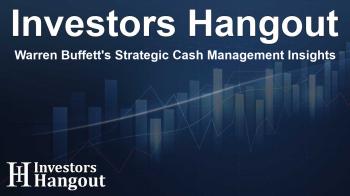Warren Buffett's Strategic Cash Management Insights

Warren Buffett's Strategic Cash Management Insights
At 94 years young, Warren Buffett demonstrates a remarkable ability to communicate complex investment concepts through his annual letters to shareholders. His messages resonate deeply, combining humility, wisdom, and transparency that remind us how precious our time with him as a guiding figure genuinely is.
Understanding Buffett's Key Investment Lessons
1) Mistakes Are Part of the Journey
Buffett candidly shares, "Sometimes I’ve made mistakes in assessing the future economics of a business I’ve purchased for Berkshire – each a case of capital allocation gone wrong." He reflects on this, admitting to errors in evaluating managers and their commitment. Such disappointments can carry emotional weight that transcends financial loss.
Buffett acknowledges that through the years, he has used the terms "mistake" or "error" multiple times in his correspondence to shareholders, a contrast to many companies that often shy away from such admissions. His commitment to honesty is a valuable lesson: not every stock will yield great returns, and investment strategies come with inherent risks. The aim should be growth, learning to navigate through setbacks. Recognizing and setting realistic goals is a vital step in this investment journey.
2) Let Your Winners Shine
Buffett states, "A single winning decision can make a breathtaking difference over time." This can be seen with major decisions like investing in GEICO and partnering with Charlie Munger. Mistakes may fade, but winners have the potential to flourish indefinitely.
Everyone encounters moments when decisions feel like failures. However, it’s essential to understand that just one successful opportunity can lead to significant change and lasting success. Perseverance is key; never lose hope.
3) Adapt to Market Conditions
Buffett emphasizes, "We are aided by a predictable large gain in investment income as Treasury Bill yields improved..." This approach urges investors to make the most of the opportunities the market presents without attempting to forecast its every move.
When risks shift, investors should seize the moment. For instance, the rising rates on T Bills present a chance to invest wisely. Rather than retreating into cash, Buffett advocates for tactical shifts that respond to favorable conditions, striking a balance without overestimating future market movements.
Even amidst skepticism surrounding his cash reserves, Buffett reassures shareholders: "Despite what some commentators view as extraordinary cash, the vast majority remains in equities." He explains that while the company's marketable equities have decreased, their non-quoted controlled equities still hold significant value, underscoring a commitment to long-term equity investments.
Examining Berkshire’s Cash Reserves
Berkshire Hathaway's (NYSE: BRKb) cash reserves have recently shown a striking increase, nearly doubling in 2024 from $167.6 billion to $334.2 billion. This growth stems from a $10 billion rise in cash and a substantial boost of nearly $157 billion in short-term Treasury Bills, accumulating to $286.5 billion.
As this cash position relates to total assets, it surged to 29%, the highest recorded since 1995. This sharp rise surpasses the 16% increase noted in 2023, more than doubling the 20-year average of 14%.
Interestingly, Berkshire's total equity securities saw a decline from $353.8 billion in 2023 to $271.6 billion in 2024, prompting a 24% drop in equity securities as a proportion of total assets. While this decline may seem alarming, it mirrors historical averages and should be contextualized by the company’s extensive portfolio of private businesses that aren't reflected in these numbers.
Although there are concerns regarding high valuations, the current economy feels stable, with earnings remaining robust. Nevertheless, the market seems to have absorbed much of the good news that was previously factored in, indicating a cautious outlook is prudent.
Frequently Asked Questions
What are Warren Buffett's main themes in his letters?
His letters often emphasize humility, learning from mistakes, and the importance of letting winning investments flourish.
How has Buffett's cash management changed recently?
Berkshire's cash reserves have notably increased, reflecting strategic adjustments to market conditions and investment opportunities.
Why does Buffett stress the importance of realistic goals?
He believes that setting achievable investment goals fosters growth and helps investors manage expectations amid market fluctuations.
What do Buffett’s investment strategies teach us?
They highlight the necessity to adapt to market changes, the value of patience, and the importance of focusing on winning investments for long-term growth.
What does the increase in short-term Treasury Bills indicate?
This increase suggests a proactive response to improving yields and an understanding of market opportunities without abandoning equities.
About The Author
Contact Logan Wright privately here. Or send an email with ATTN: Logan Wright as the subject to contact@investorshangout.com.
About Investors Hangout
Investors Hangout is a leading online stock forum for financial discussion and learning, offering a wide range of free tools and resources. It draws in traders of all levels, who exchange market knowledge, investigate trading tactics, and keep an eye on industry developments in real time. Featuring financial articles, stock message boards, quotes, charts, company profiles, and live news updates. Through cooperative learning and a wealth of informational resources, it helps users from novices creating their first portfolios to experts honing their techniques. Join Investors Hangout today: https://investorshangout.com/
The content of this article is based on factual, publicly available information and does not represent legal, financial, or investment advice. Investors Hangout does not offer financial advice, and the author is not a licensed financial advisor. Consult a qualified advisor before making any financial or investment decisions based on this article. This article should not be considered advice to purchase, sell, or hold any securities or other investments. If any of the material provided here is inaccurate, please contact us for corrections.

